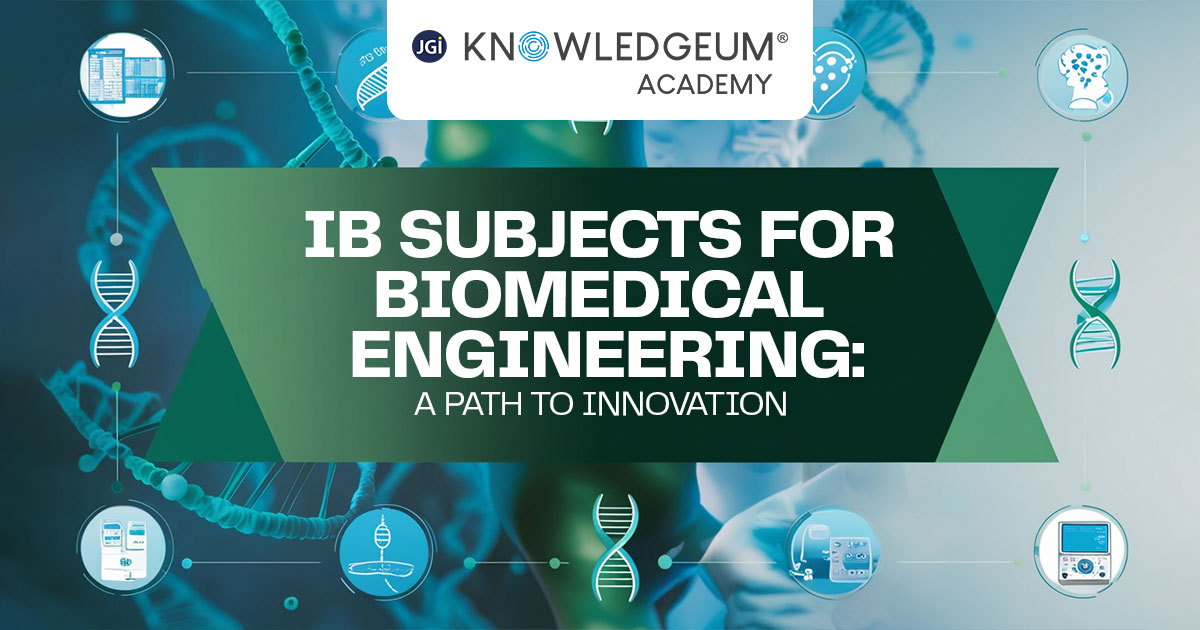IB Subjects for Biomedical Engineering: A Path to Innovation

Biomedical Engineering is an interdisciplinary field that combines principles from biology, medicine, and engineering to design new technologies and solutions for healthcare. For students interested in pursuing Biomedical Engineering, the right IB subjects can provide a strong foundation for understanding this complex field. Here is a guide to core and complementary IB subjects ideal for a career in Biomedical Engineering.
Core IB Subjects for Biomedical Engineering
1. Higher Level (HL) Biology
Biology is essential for any aspiring biomedical engineer, providing fundamental knowledge of human anatomy, physiology, and cell biology. These concepts are key for designing medical devices, prosthetics, and biotechnological solutions.
2. Higher Level (HL) Chemistry
HL Chemistry is vital in Biomedical Engineering, particularly in areas like biomaterials and pharmaceuticals. This course covers organic and inorganic chemistry, providing insight into chemical processes within the body and their relation to biomedical devices.
3. Higher Level (HL) Physics
Physics helps students understand human physiology and medical imaging technology, such as X-rays and MRI. HL Physics covers topics like electricity, magnetism, and motion, which are crucial for medical device design and innovation.
4. Standard Level (SL) Mathematics – Analysis and Approaches
Mathematics is the language of engineering. In Biomedical Engineering, mathematical modeling helps to solve biological problems and improve medical technology. This course covers calculus, statistics, and algebra, all essential for problem-solving in this field.
Complementary IB Subjects for Biomedical Engineering
5. Standard Level (SL) Computer Science
With the growing role of technology in healthcare, knowledge of computer science is invaluable. Skills from this subject, such as programming, algorithms, and data structures, are useful for software development and data analysis in biomedical applications.
6. Standard Level (SL) Design Technology
Design Technology is relevant for Biomedical Engineering students as it covers design principles and problem-solving techniques used in creating medical devices and prosthetics. This course encourages innovative solutions for real-world healthcare challenges.
7. Standard Level (SL) Environmental Systems and Societies
This course provides insight into sustainability, which is increasingly important in Biomedical Engineering. Students learn about the environmental impact of biomedical technologies, which is critical for developing eco-friendly solutions.
Skills Developed through IB for Biomedical Engineering
8. Critical Thinking and Problem-Solving
The IB program enhances critical thinking, a skill essential for Biomedical Engineering. Students learn to analyze complex problems and develop innovative, life-saving medical solutions.
9. Research and Innovation
Biomedical Engineering is research-intensive. The IB's Extended Essay promotes independent research, encouraging students to explore topics in-depth and fostering an innovative mindset necessary for success in this field.
10. Teamwork and Communication
Biomedical engineers often work in interdisciplinary teams. Group projects and presentations in the IB program help students develop communication and collaboration skills, crucial for success in biomedical engineering.
The IB Learner Profile and Biomedical Engineering
11. Being Inquirers
Curiosity is a driving force in Biomedical Engineering. The IB encourages an inquisitive mindset, essential for engineers who are constantly seeking ways to improve healthcare.
12. Becoming Knowledgeable
The broad range of IB subjects equips students with knowledge across multiple disciplines, a vital asset in Biomedical Engineering, where understanding various fields is critical.
13. Developing Open-Mindedness
The IB promotes open-mindedness, enabling students to consider diverse cultural and ethical perspectives, which is essential for creating inclusive healthcare solutions.
Conclusion: IB as a Launchpad for Biomedical Engineering
The IB program provides a robust foundation for aspiring biomedical engineers, with core sciences like Biology, Chemistry, Physics, and Mathematics, supplemented by complementary subjects such as Computer Science and Design Technology. Beyond academics, the IB instills critical thinking, teamwork, and ethical awareness, all of which are invaluable in the field of Biomedical Engineering.




